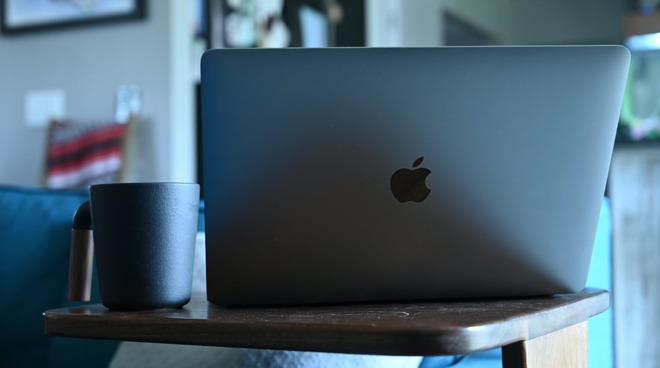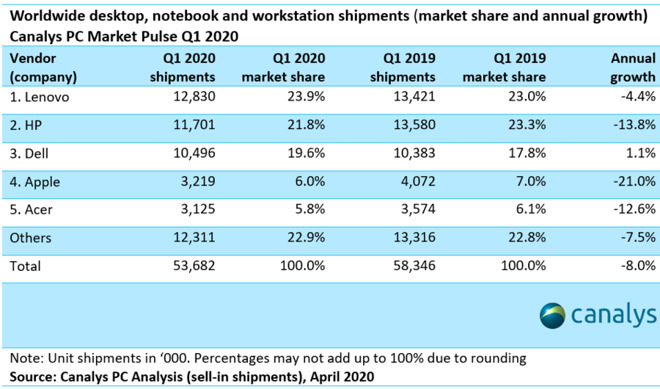Mac shipments down 21% year-on-year in global PC market shrink
Mac shipments declined in the first quarter of 2020, analysts claim, but while PC shipments overall went down by 8% year-on-year, Apple's annual decline in the PC market is more than double that of the global average.

During the global coronavirus pandemic, the demand for computers to work from home has soared, as people and companies try to replicate their working conditions within the safety of their house or apartment. Despite this, issues at production facilities related to COVID-19 meant firms couldn't gear up production to match the demand, and even hurt the industry as a whole.
In an analysis from Canalys, global PC shipments fall by 8% year-on-year for the first quarter, a drop from 58.3 million units in Q1 2019 to 53.7 million for the same period in 2020.
Of the top five vendors monitored by Canalys, Apple was the worst hit in the deceleration, with the drop from 4 million units in Q1 2019 to 3.2 million in Q1 2020 representing a decline of 21% year-on-year. It also represents a contraction in market share, from 7% in the 2019 quarter to 6% in 2020, but Apple still manages to maintain its fourth-place position on the chart.

"The PC industry has been boosted by the global COVID-19 lockdown, with products flying off the shelves throughout Q1," said Canalys research director Rushabh Doshi. "But PC makers started 2020 with a constrained supply of Intel processors, caused by a botched transition to 10nm nodes. This was exacerbated when factories in China were unable to reopen after the lunar new year holidays."
Apple's YoY percentage decline is by far the largest among vendors, with second-place HP being the nearest with an annual shrinkage of 13.8%, followed by fifth-place Ace at 12.6% down. First place Lenovo saw annual growth drop 4.4%, but it managed to gain market share, from 23% to 23.9%.
The main beneficiary is Dell, which is in third place on the chart. By seeing annual growth of 1.1% in the quarter, Dell's market share for the period increased from 17.8% for Q1 2019 to 19.6% in Q1 2020.
Canalys analyst Ishan Dutt warns that, while the production constraints will probably ease in Q2, at the same time the demand for computers in Q1 is unlikely to be sustained for very long, and with a dreary outlook for the rest of the year. "Few businesses will be spending on technology for their offices, while many homes will have been freshly equipped," Dutt suggests.
It remains to be seen how other elements of Apple's empire will fare with the ongoing medical crisis, but early reports suggested some areas may do surprisingly well. In February, it's as reported there was an increased demand for tablets in a traditionally "slow season" for the products, which may help raise iPad sales.

During the global coronavirus pandemic, the demand for computers to work from home has soared, as people and companies try to replicate their working conditions within the safety of their house or apartment. Despite this, issues at production facilities related to COVID-19 meant firms couldn't gear up production to match the demand, and even hurt the industry as a whole.
In an analysis from Canalys, global PC shipments fall by 8% year-on-year for the first quarter, a drop from 58.3 million units in Q1 2019 to 53.7 million for the same period in 2020.
Of the top five vendors monitored by Canalys, Apple was the worst hit in the deceleration, with the drop from 4 million units in Q1 2019 to 3.2 million in Q1 2020 representing a decline of 21% year-on-year. It also represents a contraction in market share, from 7% in the 2019 quarter to 6% in 2020, but Apple still manages to maintain its fourth-place position on the chart.

"The PC industry has been boosted by the global COVID-19 lockdown, with products flying off the shelves throughout Q1," said Canalys research director Rushabh Doshi. "But PC makers started 2020 with a constrained supply of Intel processors, caused by a botched transition to 10nm nodes. This was exacerbated when factories in China were unable to reopen after the lunar new year holidays."
Apple's YoY percentage decline is by far the largest among vendors, with second-place HP being the nearest with an annual shrinkage of 13.8%, followed by fifth-place Ace at 12.6% down. First place Lenovo saw annual growth drop 4.4%, but it managed to gain market share, from 23% to 23.9%.
The main beneficiary is Dell, which is in third place on the chart. By seeing annual growth of 1.1% in the quarter, Dell's market share for the period increased from 17.8% for Q1 2019 to 19.6% in Q1 2020.
Canalys analyst Ishan Dutt warns that, while the production constraints will probably ease in Q2, at the same time the demand for computers in Q1 is unlikely to be sustained for very long, and with a dreary outlook for the rest of the year. "Few businesses will be spending on technology for their offices, while many homes will have been freshly equipped," Dutt suggests.
It remains to be seen how other elements of Apple's empire will fare with the ongoing medical crisis, but early reports suggested some areas may do surprisingly well. In February, it's as reported there was an increased demand for tablets in a traditionally "slow season" for the products, which may help raise iPad sales.

Comments
With the recent adjustments in pricing of the Air and the rumoured MBP13 with better keyboards, demand should even itself out with supply if production and logistics get back to normal levels.
If the drop is confirmed relative to PC shipments, I don't think it will be indicative of anything substantial.
Many here were saying the price of the iPhone wasn't the reason sales dipped, but then Apple dropped the price of the iPhone and they sold more than ever before. So trying to claim price isn't a huge factor is entirely false.
I have a 2020 Air on order, I ordered it 1 week ago it will be 1-2 more weeks before delivery.
All these years later, I'm amazed that people--including some who've posted in this thread--STILL don't get that volume sales without strong profitability mean nothing. Thirteen years after its debut, I'm still reading "blah, blah, blah" about iPhones being too expensive... and meanwhile, Apple took 68% of GLOBAL mobile phone profits last year, with Samsung its nearest competitor at 17%, and every other company fighting for the leftover profit scraps. So much for high volume sales.
Having the lion's share of profit is irrelevant if you aren't doing much with it compared to competitors who are doing more (even though their profits are less) .
If you are pumping huge amounts into R&D from your revenues, that will have an impact on your overall profitability but your devices/services could see the benefits of that all the same in spite of leading to lower potential profits in some situations.
Does that mean having the most profits is actually relevant from a consumer perspective? Not at all.
Consumers only really need to care about the products they are buying and the price they are willing to pay, not how profitable a company is.
The consumer draws that line (price) but profits (in the sense of who makes the most) are not relevant.
What is relevant is if your business is healthy enough to keep things going.
Just like Samsung or Huawei, HP, or whoever.
In this case, I very much doubt Mac prices are the cause of such a large potential falloff in sales. It is just possibly a huge (hopefully short lived blip) due to the coronavirus.
The swing probably favoured lower priced manufacturers in this particular situation, which is fully understandable.
Look, I know that you like and prefer Macs - I cannot blame you as my work issued 13 inch MBPro is the single most favorite laptop that I have ever owned or used and my #4 favorite among all tech devices I have ever owned behind my NES, my Sony Walkman and my Samsung Galaxy Mega smartphone - but there is no reason to just make up stuff. Windows, Android, ChromeOS etc. would never succeed in the marketplace if they were half as bad as Apple fans claim that they are. The funny thing is that it is mostly one-sided. Few Windows, Android or ChromeOS users bash Apple products, and when they do 99% of it is either price or because the devices are a bit more locked down than they prefer, i.e. perfectly valid - and actually accurate - economic or tech reasons. But go to the Apple forums and it is endless trashing of users of other platforms simply for the crime of merely existing. And for the vast majority of them it is easy to tell that they have never seriously used - or used at all - the devices they are trashing.
To put it another way, no one is going to buy any Windows device for work purposes that has inferior specs to, say, a MacBook Air. It is just that a Lenovo, Dell or HP with $999 MBA specs will cost about $650 and an Acer or Asus with MBA specs can be had for $500. So while you might call them "cheap" they actually do have the same CPU, integrated graphics card, RAM module etc. as the MBA does with the real differences likely being the screen - and even that is going to be 1080p as opposed to the 1366x768 that you will see on actual cheap Windows devices - plus the lack of USB Type C ports and of course it is going to be maybe twice as thick build wise.
1. Canalys has zero track record on accurate predictions.
2. At least in the US and Canada, lockdowns came very late in the day, so sales in the first two months wouldn’t have been affected.
3. Admittedly a small sample, but my checks with computer retailers in my town suggest that March saw a run on purchases of iPad, iPad Pro, and various MacBooks as people prepared for online classes and meetings and working from home.
I’m not doubting the industry will suffer compared to “normal,” but the idea that Apple is doing nearly three times as badly as the industry average is pretty laughable.